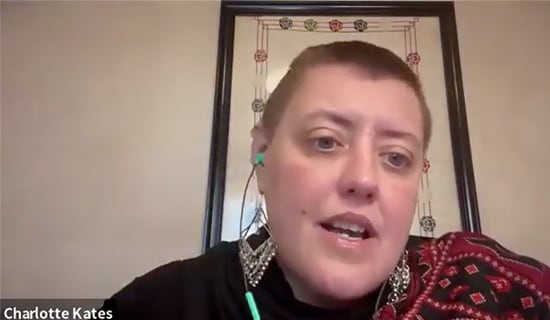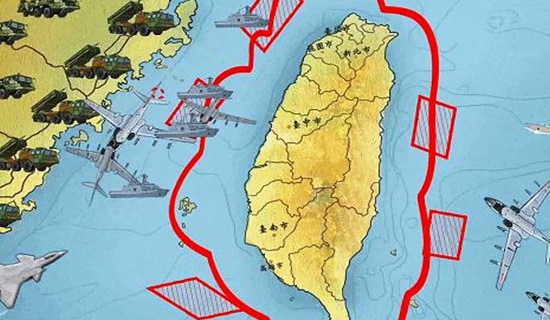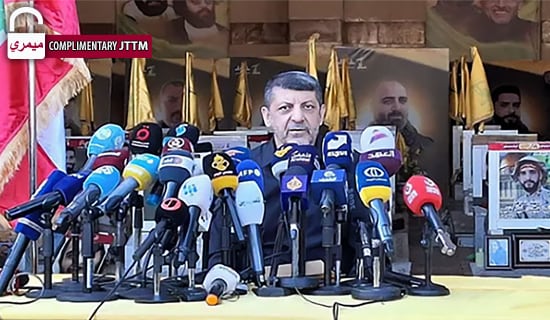On the afternoon of May 29, 2020, depressurization of a diesel fuel tank occurred at a thermal power plant in Norilsk in Russia's Arctic region of Krasnoyarsk. According to the Norilsk Nickel company press release on the same day the incident was reported to the regional headquarters of the Ministry of Emergencies. about 20 thousand tons of fuel spilled over an area of about 350 square meters. On the same day, it became known that diesel fuel from the spill got into water, in particular, into the "Daldykan" river.
On June 3, 2020, Svetlana Radionova, head of Rosprirodnadzor (The Federal Service for Supervision of Natural Resources), reported that the maximum permissible concentration of harmful substances in water bodies in Norilsk had been exceeded tens of thousands of times. She added that about 6 thousand tons of oil products had leached into the soil, and about 15 thousand tons had polluted the water bodies.[1] The spilled fuel after polluting Lake Pyasino would then pollute the Kara Sea.[2] Krasnoyarsk Governor Alexander Uss lamented the disaster: "Fuel got into Pyasino. This magnificent lake is about 70 kilometers long, of course, there are fish and a good biosphere. But it's impossible to predict how it will bear this load now."[3]
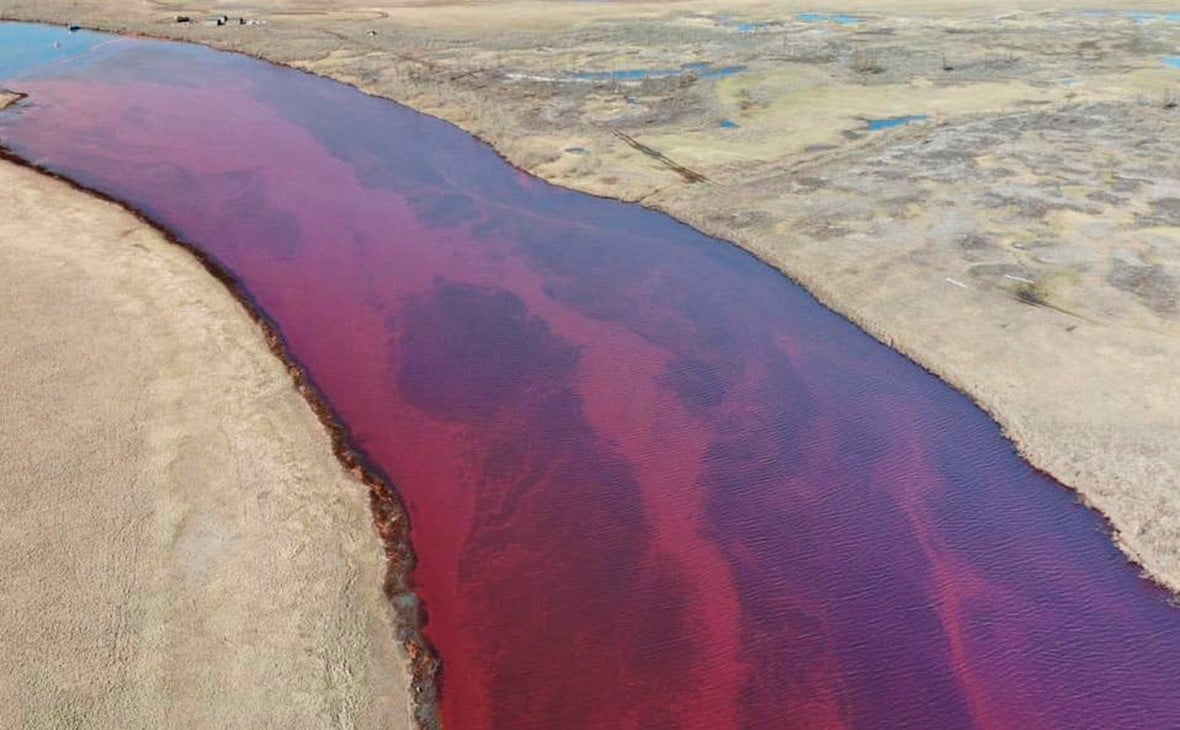
Water turned red by the oil spill (Source: Rbc.ru)
The power plant chief was detained as a suspect in criminal cases involving the pollution. [4] The question arose why a state of emergency was proclaimed only two days later. Vladimir Putin charged that the regional authorities "had learned about the accident only from the social networks." Kommersant's investigation showed however that news of the accident had reached Moscow within an hour after the accident had been reported to the Civil and Emergency Defense Office of the Norilsk administration.
This fueled speculation that there were other explanations for the delay. The ecologist Aida Levatova wrote in Echo of Moscow: "The company [Norilsk Nickel] and the [Norilsk] city administration waited several days before they reported the accident to the Ministry of Emergency Situations, because of this, the incident turned into an ecological disaster. The company claims that the issue was reported on-line to one of the situational centers. The city authorities say that they learned about the scale of the disaster from social networks. As a result, the state of emergency in Norilsk and Taimyr was introduced only on June 1 (…). Bureaucratic infighting and cabinet proceedings are horrifically tardy in responding to the events." [5]
However, the discussion soon moved beyond the immediate response. Responsibility for the ecological disaster could not be laid at the power plant chief. Local residents reported "These [fuel] tanks stood for 30 years and nobody cared about them. The inspectors did not see that the soil was washed out and all this washes away so much that the bottom exploded. Environmentalist Sergei Shakhmatov deputy chairman of the Krasnoyarsk City Council's Environmental Commission who flew to Norilsk to examine the situation asked pointedly: there are questions for the operator - TPP-3 and for the supervisory and inspection bodies. There is information that the tank has been under repair since 2016. And where were you then? A tank of 30 thousand tons is not a needle in a haystack, and if there is no operational permit for it, this is a criminal case."[6]
The elephant in the room could not be ignored either. The company that operated the plant is owned by oligarch Vladimir Potanin, reportedly Russia's richest man. A chink in Putin's armor is the public perception that he is too close to oligarchs like Potanin and less sensitive to the average Russian.[7] Putin believed that he had an opportunity to correct that perception. In a June 5, 2020 video, broadcast nationally, Putin publicly chastised Potanin for failing to check the fuel tanks' condition. A penitent Potanin, standing at the site of the spill said "I say this not as a businessman but as a person who is sorry about what happened, as much as is needed is what we will spend.[8] his company would defray the cost of the cleanup efforts estimated at 10 billion rubles ($146 million) and would pay fines for damage to the environment. Putin then added to Potanin's humiliation by pointing out that replacing the aging fuel tank would have cost a tiny fraction of that amount. Putin also promised inspections to assure that such a disaster would not recur. [9]
Putin's public chastisement of Potanin did not convince everyone. Dmitry Drize, a featured columnist for Kommersant noted that Putin was basically repeating his performance during 2008 when he had forced oligarch Oleg Deripaska to sign an order rescinding the closing down of a factory and had then reminded him to return Putin's pen with which he had signed the order. Such displays did not translate into proper oversight on the actions of the oligarchs. Dmitry Popov a columnist for Mk.ru, believes that the state had ample warning that this disaster would occur, and Putin despite his claims to curb the oligarchs had only manually tweaked the system that he had inherited.
Below are Drize's article titled "It Is Necessary To Keep An Eye on the Oligarchs[10] and excerpts from Popov's article titled "Putin's Anger Descends on the Oligarchs.[11]
Drize: Putin Used The Humiliation Of Potanin To Bolster His Own Image
"It looked very dramatic: with the abundant nature of the Russian north as a backdrop, [stood] the billionaire and oligarch Vladimir Potanin, together with the immediate supervisors of the ill-fated TPS [thermal power station] operator company and the recently scolded Governor of the Krasnoyarsk Territory Alexander Uss. They, like fined school boys were held accountable before the president to the entire country. At the same time, Vladimir Putin showed generosity - he does not judge harshly, he is rather lenient. The very answer to the head of state served as a punishment: a world-famous businessman was in a simple company uniform jacket, not in a Mercedes, not in the palace, but in the tundra, however beautiful."
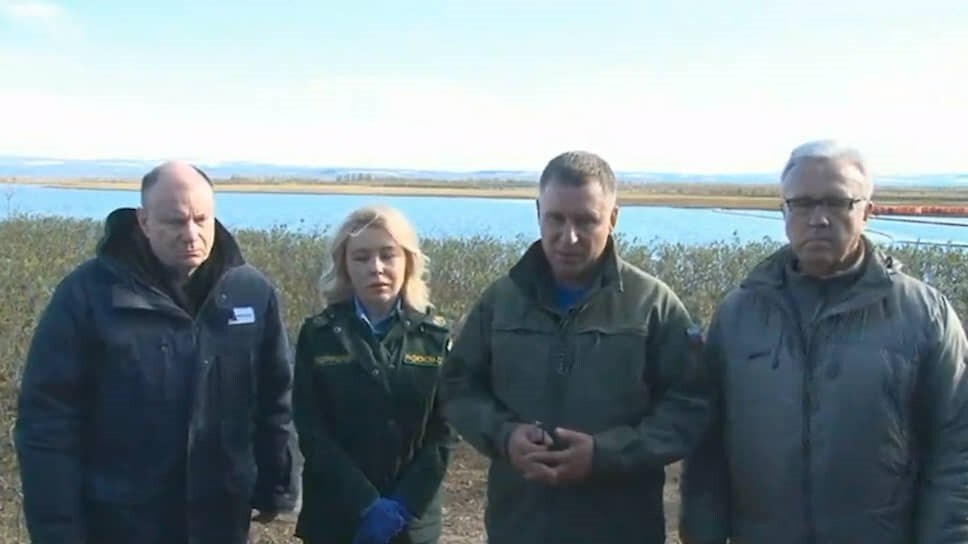
Potanin (extreme left) and Uss (extreme right) getting a public dressing down from Putin (Source: Kommersant.ru)
"Eh, Vladimir Olegovich [Potanin], you should've just changed one fuel storage tank, but now you will have to spend 10 billion.” [says Putin]. Potanin replies this won’t happen again [the author uses the stock response of children caught in the act].
"Next scene: Putin has finished with Potanin, communication with Moscow was disconnected: "get back to work", as they say. Now Putin is listening to volunteers - these are the good heroes in contrast to the disgraced big managers. Does this scene sound familiar? – You, are correct. Vladimir Putin has a rich experience in flogging oligarchs publicly. 11 years ago, as Prime Minister, Putin was in the city of Pikalevo, Leningrad Region. There was, another big businessman, Oleg Deripaska (an old acquaintance of Potanin by the way), who did not pay workers' wages. Do you remember this? Putin's quote “give me back my pen” went down in history. So next in line for a public reprimand was Vladimir Potanin.
"To top this all off, this entire beautiful performance is extremely useful from the perspective of bolstering the leader's image.
"But the most important thing is, of course, not a television picture. Just as diesel fuel melted into the tundra soil, numerous sources literally cried out: "Potanin you have really done it! It's time to hold the owner of Norilsk Nickel accountable. What have you done [with the company]? The time has come for him to answer!"
"As a result, State Duma deputy from United Russia Alexander Yakubovsky asked the Investigative Committee to remove Potanin from the management of Norilsk Nickel. Against this background, calls to nationalize the company appeared. Mikhail Prokhorov stood up for his former partner, he said that the country can't allow the redistribution of property. Dmitry Peskov reiterated this thesis: The Kremlin is not going to do anything like that. Maybe not, but these are difficult times now.
"As is known, Norilsk Nickel (one of the most attractive Russian assets) has repeatedly been the subject of major corporate wars. We can say that the embers [of these wars] are still smoldering. In times when oil and gas are getting cheaper, and the West is closed off up due to sanctions, there are fewer and fewer "tasty morsels" in the Russian economy. Naturally, there are many who want to take a bite of them. Well, speaking theoretically of course. And it is hard to come up with a better pretext to get these enterprises than an environmental pollution. Ecology is really a scourge for such enterprises.
"The fact that the president was very lenient to Potanin suggests that the Kremlin understands the magnitude of the problem. A new war for property is a direct threat to Russian stability. This is even worse than Western sanctions. But that is not all.
"This story highlights another systemic flaw: what is in fact the role of the state? We are talking about a particularly dangerous facility [Norilsk Nickel]. Where is the state supervision? Where are the inspections? It is necessary to keep an eye on the oligarchs; however influential and rich they may be. Where and who is keeping watch? Who is responsible? Whose area of responsibility is it? – It's all unclear. But the saddest thing is that the lessons are not being learned."
Popov: The Danger Was Known And Nobody Did Anything About It
"The north reeks of diesel fuel. This alas is the biggest news of the week. Norilsk and the accident are our lives in miniature: scary, harsh, uncomfortable, rusty, unfair and fantastically beautiful at the same time, bewitchingly spacious, majestic and wide open. Below the cemetery, above the sun ... Summer, the traditional time of bluebells, [arrived in Russia]. However, the authorities, it seems, took a hoe in hand and went to weed them out.
"What does one need to know about the accident in Norilsk? Somewhere in the early 2000s, the Ministry of Emergency Situations warned that permafrost will melt, which means that inevitable soil subsidence under the facilities and the deterioration of infrastructure built back in Soviet times will lead to a series of disasters in 10-15 years. Unless, of course, you start urgently repairing, rebuilding, investing and not squeezing profits from what is left of a great country, following the principle of "after us, the deluge."
"20 years have passed since that prediction. After an emergency with diesel fuel, Deputy Prime Minister Victoria Abramchenko instructed Rostekhnadzor [the Federal Service for Ecological, Technological and Nuclear Supervision] and Rosprirodnadzor [Federal Service for Supervision of Natural Resources] to inspect the technical condition of hazardous production facilities in the Arctic zone. The Ministry of Emergencies requested a foreign satellite survey of the scene of the accident…
"Perhaps, that is all one needs to know about the issue. The rest is details, common signs of the ordinary life of the country.
"Putin's fury descended upon the oligarchs. In principle, one can understand the president.
"As the philosopher [Alexander] Dugin says, Vladimir Vladimirovich [Putin] made capitalism in Russia a bit more national. So, in theory, the president can demand more responsibility from businessmen, who are getting fatter by milking the country. But in practice, Putin is forced to work in (again as Dugin puts it) an 'operating system' that was downloaded in 1991 to a computer called 'Russia'. Since this operating system is spiritually anti-people, it increasingly collapses. And Vladimir Vladimirovich [Putin] in manual mode is trying to patch the holes and make it a bit more 'user-friendly' for people…"

Dmitry Popov (Source: Mk.ru)
[1] Tass.ru, June 3, 2020.
[2] Tass.ru, June 4, 2020.
[3] Gazeta.ru, June, 9, 2020.
[4] Ria.ru, June 3, 2020.
[5] Echo.msk.ru, June 4, 2020.
[6] Spbdnevnik.ru, June 8, 2020.
[7] Levada.ru, April 14, 2020.
[8] Currenttime.tv/a/Russia. June 5, 2020.
[9] Rbc.ru, June 5, 2020.
[10] Kommersant.ru, June 5, 2020.
[11] Mk.ru, June 7, 2020


